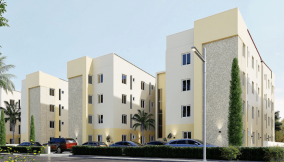Growth of Nigeria’s real estate fell sharply to -21.99 percent in the second quarter of 2020, its lowest level since 2016, the National Bureau of Statistics said in the country’s gross domestic product report released, Monday.
The measure of the total monetary value of economic activities in the property industry in Q2 was –18.15 percentage points lower than the – 3.84 percent growth recorded in the corresponding quarter of 2019, and –16.72 percentage points relative to the -5.27 in Q2 2016.
Analysis of the NBS report shows that on a quarter-onquarter basis, the sector declined by –2.71 percent in the review period.
According to a Lagos-based real estate consultant, the effect of the coronavirus pandemic on Nigeria’s property market is evident in the second quarter figure by the NBS.
“Real estate transactions were partly on a moderate level in Q1 and so there was a slight decline but with the Q2 numbers, it shows that the sector has been largely affected especially the commercial arm of the market,” the consultant who asked not to be identified said.
Like many other industries, Nigeria’s property sector which is yet to recover from the country’s 2016 recession has been disrupted by the impact of COVID-19 as social distancing, lower oil price and the slowdown in economic activities has halted real estate transactions.
According to NBS data, the property market contributed 5.30 percent to the Nigerian economy in the second quarter of 2020. This is lower than the 6.43percent it recorded in the corresponding quarter of 2019.
Gripped by the uncertainty created by the coronavirus pandemic, players in Nigeria’s property industry were forced to adopt the wait-and-see position.
“We had a client who wanted to buy a property, and we already finalized the process but due to the virus outbreak and currency uncertainty, he said he would want to wait for the next 90 days to watch the market,” Chidi Etoniru, managing partner of Joe Etoniru and Associates, a real estate development company said.
The outbreak of the rampaging virus also restricted real estate players from going on the field for property inspections, project development and real estate transaction as the Federal Government enforced a 5-week lockdown in Lagos, FCT and Ogun.
Meanwhile, before COVID-19 pandemic, access to affordable housing in Nigeria was crippled by among other factors the lack of non-functioning mortgage system, high cost of property development buoyed by the country’s 41 years old Land Use Act.
Individual efforts at increasing Nigeria’s real estate properties by way of developing more houses shows offering insights into possible solutions have not helped to reduce the demandsupply gap or increase the ownership level estimated at more than 20 million units.
Despite its large-size population, Africa’s largest economy is crawling behind its peers in terms of home ownership level. Whereas home ownership rate is 84 percent in Indonesia, 75 percent in Kenya and 56 percent in South Africa, Nigeria, Africa’s most populous nation has 25 percent.
Join BusinessDay whatsapp Channel, to stay up to date
Open In Whatsapp





